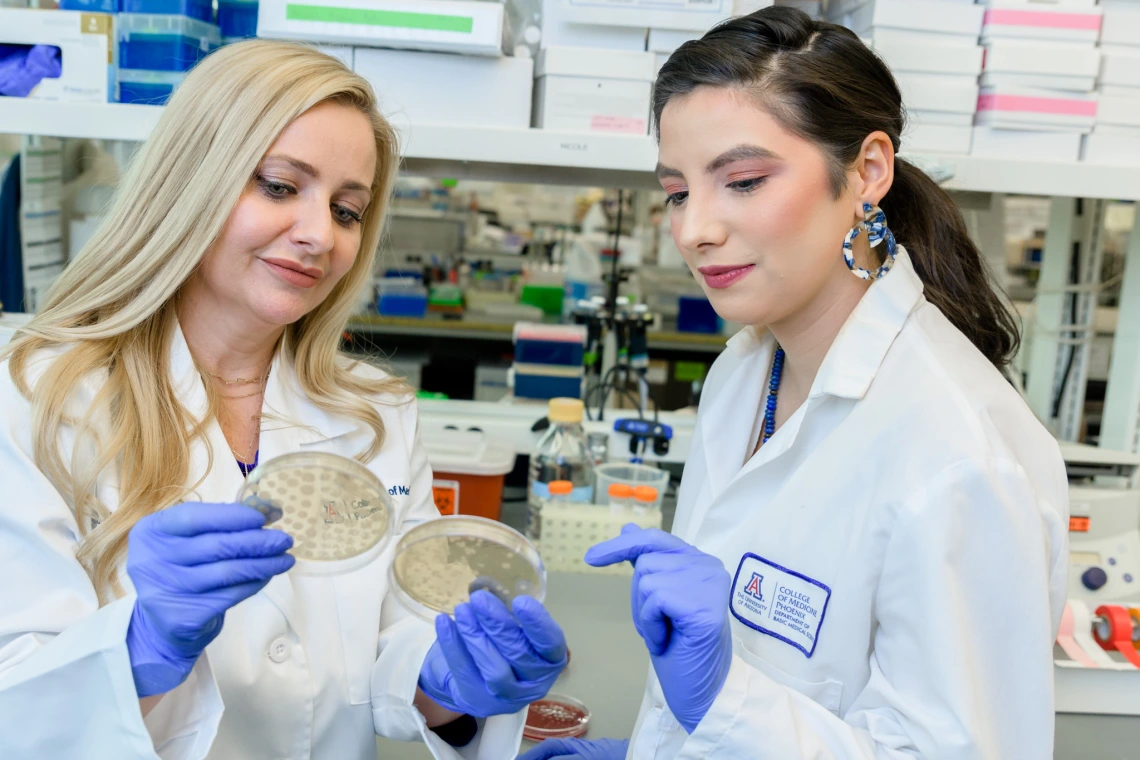Microbiomes may provide a biomarker for endometrial cancer

From left, Melissa Herbst-Kralovetz and Nicole Jimenez work in the Herbst-Kralovetz lab.
A study by researchers from two Arizona universities discovered changes in the vaginal microbiome of patients with endometrial cancer and other benign endometrial conditions. One key finding was that the protective lactobacillus dominance was reduced in women with endometrial cancer.
Their results were published in the Nature Partner Journal Biofilms and Microbiomes in May.
“Endometrial cancer rates are skyrocketing,” said Melissa Herbst-Kralovetz, PhD, professor at the University of Arizona College of Medicine –Phoenix, director of the Women’s Health Research Program and Microbiome Initiative, member of the University of Arizona Comprehensive Cancer Center and senior author on the publication. “In developed countries like the U.S., it’s the number one gynecologic cancer in women, and it’s the fourth most common cancer in women globally. It has just surpassed ovarian cancer as being more deadly.”
By 2030, there will be 122,000 new cases per year in the U.S. alone according to a recent publication. In Arizona, endometrial cancer disproportionately impacts women who are Native American and Latina, according to a 2019 study, but across the nation, it's higher in African American women and Latinas, Herbst-Kralovetz said. In these women, there is a higher risk of mortality due to a lack of access to care and late stage diagnosis.
Collaborating to study endometrial cancer

From left, Melissa Herbst-Kralovetz, Chloe R Herman, Gregory Caporaso, Paweł Łaniewski and Nicole Jimenez.
In this cross-sectional study, researchers from the University of Arizona and Northern Arizona University analyzed vaginal and rectal swabs of 192 women undergoing hysterectomy for newly diagnosed cancer or benign gynecologic conditions. Key findings included the association of specific bacteria with endometrial cancer, like Anaerococcus, Prevotella, Porphyromonas, and Peptinophilus, and the impact of vaginal lactobacilli dominance on bacterial swapping to a nearby site.
The study also found a relationship in bacterial swapping between the rectum and vagina, resulting in more invasive bacteria, such as Prevotella and Peptoniphilus, and less protective bacteria, such as lactobacilli, leading to more bacterial transfer.
“The bacteria that we see swapped the most between sites in this cohort were actually also associated with endometrial cancer,” Herbst-Kralovetz said.
The researchers observed that patients diagnosed with endometrial cancer had more microbe to microbe correlations, specifically in the family Peptoniphilaceae. Unique microbial features of endometrial cancer included Anaerococcus, Porphyromonas and Peptoniphilus in vaginal samples and Buttiaxella in rectal samples.
They observed a proposed transfer of microbiota between mucosal sites, with Prevotella timonensis and Peptoniphilus A sp. being most shared between sites. As Lactobacillus dominance increased, this transfer was reduced. They also identified assumed metabolic pathways relating to the dysregulation of amino acids, complex carbohydrates degradation, and hormone metabolism in patients with endometrial cancer.
Herbst-Kralovetz said the study demonstrates a need for more research examining multiple anatomical sites and the dynamic interplay between the microbiomes of the urogenital, rectal and upper female reproductive tract. Understanding these complex microbial interactions is essential to advancing women’s health and developing targeted interventions.
Contributing to the publication were Nicole Jimenez, Paweł Łaniewski and Nichole D Mahnert from U of A, Chloe R Herman, Emily Cope and J. Gregory Caporaso from Northern Arizona University, Dana M. Chase, who is now at the University of California, Los Angeles, and Keehoon Lee from the Translational Genomics Research Institute in Flagstaff.
“Our team of clinical collaborators, bioinformaticians and basic scientists, really allowed us to make headway into asking these translational questions,” Herbst-Kralovetz said.
These results could one day lead to a screening that uses vaginal microbiome as an endometrial cancer biomarker.
“We have to keep sounding the alarm on this issue of endometrial cancer; it's not going away,” Herbst-Kralovetz said. “We need a better understanding of the condition itself so that we can develop more robust interventions, but also novel diagnostics.”



